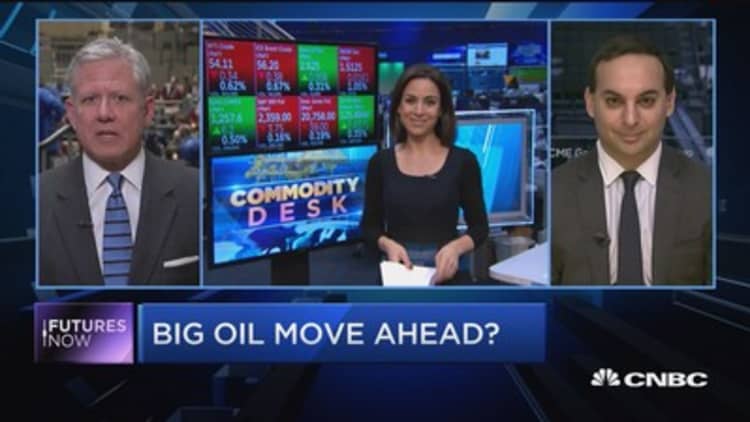Oil prices were little changed on Monday as investors showed record confidence that prices would rise further, but the prospect of faster growth in U.S. oil production capped gains.
U.S. West Texas Intermediate futures settled up 6 cents at $54.05, after earlier rising more than 1 percent.
Brent crude oil fell 4 cents to $55.95 a barrel by 2:34 p.m. ET (1934 GMT) on its second to last day as the front-month contract.
Traders said futures pared gains from earlier on Monday after a report from energy data provider Genscape showed a build of more than 800,000 barrels of crude at the Cushing storage hub in Oklahoma, where WTI is priced.
Investors raised their bets on rising Brent crude oil prices to a new high last week, data from the InterContinental Exchange showed on Monday, breaking the 500,000-lot mark for the first time on record.
Money managers raised their bullish U.S. crude futures and options positions in the week to Feb. 21 to the highest on record, the U.S. Commodity Futures Trading Commission (CFTC) said on Friday.

Investors now hold 951,312 lots worth of U.S. and Brent crude futures and options, equivalent to nearly 1 billion barrels of oil and valued at more than $52 billion, based on current Brent and WTI benchmark prices.
"With speculators increasing their bullish bets on U.S. crude to an all-time high, the risk of disappointment and subsequent downward spiral in prices has never been greater," oil brokerage PVM's Stephen Brennock said.
Among the risks is the level of compliance to the deal between the Organization of the Petroleum Exporting Countries (OPEC) and other producers to bring down oil output by about 1.8 million barrels per day (bpd).
OPEC's record compliance with the deal has surprised the market, and the biggest laggards, the United Arab Emirates and Iraq, have pledged to catch up with their targets.
The International Energy Agency put OPEC's average compliance at a record 90 percent in January. Based on a Reuters average of production surveys, compliance stands at 88 percent.
A Reuters survey of OPEC production later this week will show compliance for February.

"It would appear OPEC has done a commendable job of stabilizing the market. But we are also of the opinion that their intended stability is likely attached to a $60 price handle rather than $50," Jim Ritterbusch, president of Chicago-based energy advisory firm Ritterbusch & Associates, said in a note.
"The longer that values stay below prices needed to drive budget improvement amongst the membership, the greater the likelihood of cheating that could force an eventual unraveling of the OPEC agreement," Ritterbusch said.
Also looming over the success of the deal is the reaction of U.S. shale producers to rising prices and their ability to increase output.
U.S. drillers added five oil rigs in the week to Feb. 24 to 602, the most since October 2015, energy services firm Baker Hughes said on Friday.
Over the past two weeks the U.S. implied shale oil rig count went up by 15.
"[This] is marginally higher than our projected 7 rigs per week for first half 2017," wrote Nordic bank SEB chief commodities analyst Bjarne Schieldrop.
— CNBC's Tom DiChristopher contributed to this report.

